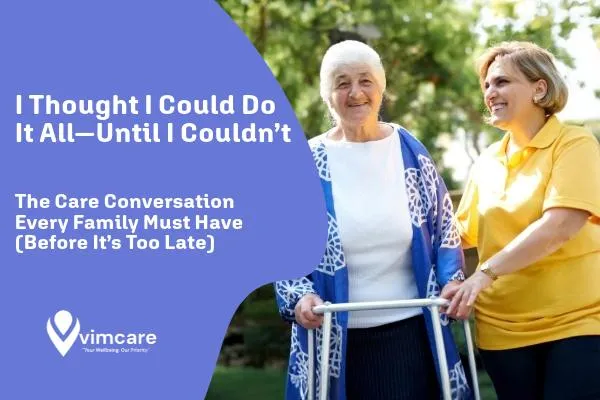
I Thought I Could Do It All—Until I Couldn’t
I Thought I Could Do It All—Until I Couldn’t
I used to believe I could juggle everything—being a parent, working full-time, managing the home, and taking care of Mum. But slowly, things began to unravel. What started as a few errands turned into daily visits, emergency phone calls, and sleepless nights.
That’s when I realised: I couldn’t do it all alone.
If this sounds familiar, you’re not alone either. Many families find themselves quietly taking on the role of caregiver without realising the toll it’s taking. This is why talking about domiciliary care or care in your own home is not just helpful—it’s essential.
This is the care conversation every family must have—before it’s too late.
The Emotional Weight of Caregiving
At first, caring for Mum didn’t seem like a big deal. I could manage her shopping, cook meals, and pop in to check on her. But over time, the list of responsibilities grew. She needed help with bathing. She began forgetting her medication. Her mobility got worse.
I told myself, “I’ve got this.” But I was missing deadlines at work. I was short with my kids. I was constantly tired.
Caregiver burnout is real, and it sneaks up on you. Carers UK reports that over 5 million people in the UK are unpaid carers, with many juggling work and care. The emotional, physical, and financial costs can be overwhelming.
You don’t have to wait for a breaking point.
What Is Domiciliary Care?
Domiciliary care, often referred to as home care or care in your own home, involves professional carers coming to your loved one’s home to provide tailored support. This can include:
Personal care (washing, dressing, grooming)
Medication reminders or administration
Meal preparation
Light housekeeping
Companionship and emotional support
The beauty of domiciliary care is flexibility. Whether your loved one needs a few hours a week or round-the-clock help, support is designed around their needs.
👉 Learn more: What Is Domiciliary Care and How Does It Work?
For me, the biggest shift was being able to return to being a daughter—not just a carer. I could enjoy time with Mum again.
How to Start the Care Conversation
It’s not easy. Talking about declining health, loss of independence, or bringing someone new into the home can feel uncomfortable. But avoiding the conversation only delays solutions—and increases stress.
Here’s how to approach it:
Choose the right moment. Avoid starting this conversation during a crisis.
Be gentle but honest. Focus on what’s best for their well-being.
Involve your loved one. Give them a voice in the decision.
Use examples. Talk about recent incidents that raised concern.
If you’re not sure where to begin, this guide might help: How to Talk to Loved Ones About Home Care Support
Recognising When It’s Time for Help
Some signs that your loved one might need extra support are obvious—others are subtle. Keep an eye out for:
Missed medications
Struggles with personal hygiene
Confusion or forgetfulness
Unopened mail or unpaid bills
Weight loss or poor eating habits
Isolation or mood changes
If you notice any of these, don’t wait. Early support can make a world of difference.
👉 Also read: Signs a Loved One Needs Home Care
Busting Myths About Home Care
Many families hesitate to seek help due to common misconceptions:
“Home care is only for the terminally ill.” Not true. Many people use home care to stay independent longer.
“It means giving up control.” Actually, care in your own home supports autonomy—it keeps people in charge of their routines.
“We can’t afford it.” There may be help available. Visit NHS Social Care Funding Guide to see if your loved one qualifies for funding.
Choosing a Trusted Domiciliary Care Provider
When choosing a provider, look for:
CQC registration and inspection ratings
Trained and vetted carers
Tailored care plans
Regular reviews and family communication
At Vim Care Limited, we offer all of the above and more. Our team is fully regulated by the Care Quality Commission (CQC) and committed to person-centred care that promotes dignity and respect.
👉 Learn more: Choosing the Right Home Care Provider
Life After Accepting Support
Getting help doesn’t mean failure. It means choosing to protect your well-being—and your loved one’s.
When we welcomed professional carers into Mum’s home, the pressure lifted. We had space to laugh again. She felt secure, and I felt relief.
Sometimes, the bravest thing you can do is say, “I need help."
Final Thoughts: You’re Not Alone
If you’re reading this, you might already be on the edge of burnout—or wondering how to help someone else who is.
Take a deep breath. You don’t have to carry it all. Domiciliary care can restore balance, dignity, and connection.
Start the care conversation today. Before it’s too late.
Summary
Caregiving alone can lead to emotional and physical burnout.
Domiciliary care provides flexible, professional support in familiar surroundings.
Start the care conversation early, before a crisis forces your hand.
Recognise the signs that extra help is needed.
Debunk the myths—home care supports independence, not undermines it.
Choose a trusted provider like Vim Care Limited to ensure quality, compassionate care.
To Speak to an Expert
Take our Free Care Needs Assessment to help us create a personalised session just for you. Whether you’re exploring care options for yourself or a loved one, we’ll focus on your unique challenges and goals.
It takes less than 2 minutes
It’s completely free.
Unlock tailored advice and a personalised care plan instantly.
BOOK FREE 1 - 1 CONSULTATION NOW
Get in Touch
📞 Contact us at 07770428012
📧 Email us at [email protected]
🌐 Learn more at www.vimcarelimited.com
